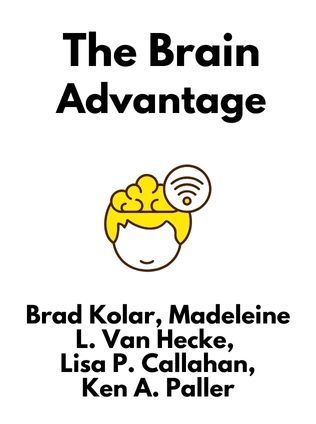
The Brain Advantage
Become a More Effective Business Leader Using the Latest Brain Research
By Brad Kolar, Madeleine L. Van Hecke, Lisa P. Callahan, Ken A. Paller
Published 11/2009
About the Author
Madeleine L. Van Hecke, Lisa P. Callahan, Brad Kolar, and Ken A. Paller bring a diverse range of expertise to The Brain Advantage. Madeleine L. Van Hecke is the author of Blind Spots: Why Smart People Do Dumb Things. Lisa P. Callahan is the global leader for learning and knowledge management for the outsourcing practice at Accenture. Brad Kolar is the president of Kolar Associates, a management and leadership consulting company. Ken A. Paller is a cognitive neuroscientist at Northwestern University. Together, they combine their knowledge in psychology, management, and neuroscience to explore how leaders can leverage brain research to enhance their effectiveness.
Main Idea
The Brain Advantage: Become a More Effective Leader Using the Latest Brain Research ties the latest brain research to its implications for leadership styles and practices. The authors argue that understanding how the brain works can help leaders become better decision-makers, communicators, and change agents. They highlight the importance of stepping outside of habitual behaviors, fostering creativity, and managing stress effectively.
Table of Contents
- Introduction
- Using Constraints to Free Up the Mind
- Do Expert Brains Think Less?
- Eureka! How to Make New Connections
- Can I Trust You?
- Ouch! You Left Me Out
- Will the 'Real' You Please Stand Up?
- Fire, Ready, Aim?
- That's Not Fair
- Rules of Engagement
- Mood Contagion
- Often Wrong, But Never in Doubt?
- The Halo Effect
- Seeing is Believing? Not Always
- Multitasking - Asset or Liability?
- Fight, Flight, or Freeze
- What Doesn't Kill You Will Make You Stronger
- Can Working Less Generate More?
- Conclusion
Introduction
The introduction of The Brain Advantage sets the stage by emphasizing the remarkable capabilities of the human brain. The authors explain that leaders can significantly enhance their effectiveness by understanding and leveraging the latest brain research. Unlike other creatures, humans can step outside their habitual behaviors and reflect on their actions, which is a crucial skill for effective leadership.
Using Constraints to Free Up the Mind
One of the key insights from brain research is the role of constraints in fostering creativity. The authors discuss a study on jazz improvisation, highlighting that certain brain areas become less active during creative activities. This suggests that reducing executive control can enhance creativity. Leaders can apply this by setting boundaries that encourage innovative thinking while giving employees the freedom to explore within those limits.
"Give people freedom within the company's goals. Tell them which mountain to climb, but let them decide how to climb it." - Teresa Amabile
- Leaders at a tech company allow developers to choose their methods for solving a problem, fostering innovation.
- A marketing team is given a target audience but can decide on the best creative strategies to engage them.
Do Expert Brains Think Less?
Research shows that expert brains are more efficient and require less effort to perform tasks. This efficiency allows experts to focus their mental energy on more complex problems. However, there is a risk of becoming too reliant on autopilot, which can lead to mistakes.
Sign up for FREE and get access to 1,400+ books summaries.
You May Also Like
The Subtle Art of Not Giving a F*ck
A Counterintuitive Approach to Living a Good Life
By Mark MansonRich Dad Poor Dad
What the Rich Teach Their Kids About Money - That the Poor and Middle Class Do Not!
By Robert T. KiyosakiHow To Win Friends and Influence People
The All-Time Classic Manual Of People Skills
By Dale CarnegieFreakonomics
A Rogue Economist Explores the Hidden Side of Everything
By Steven D. Levitt and Stephen J. Dubner



















